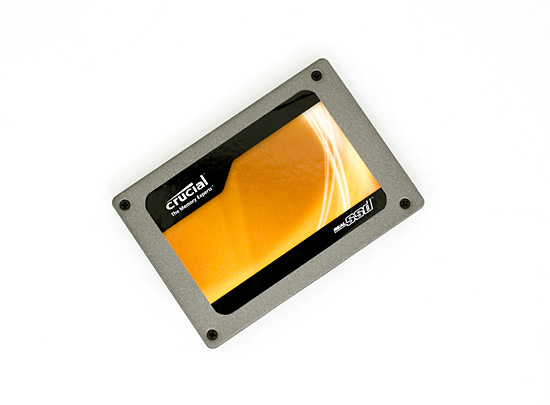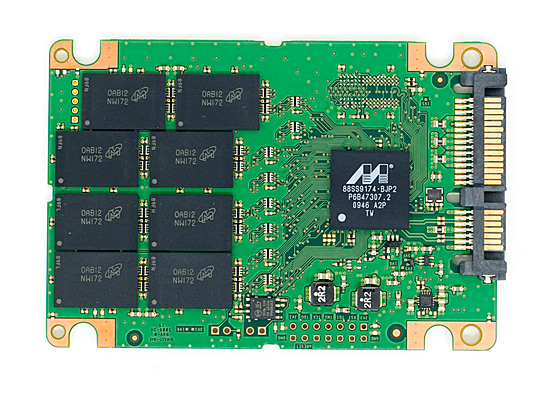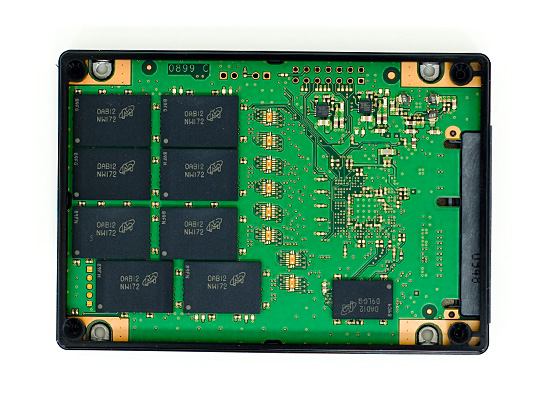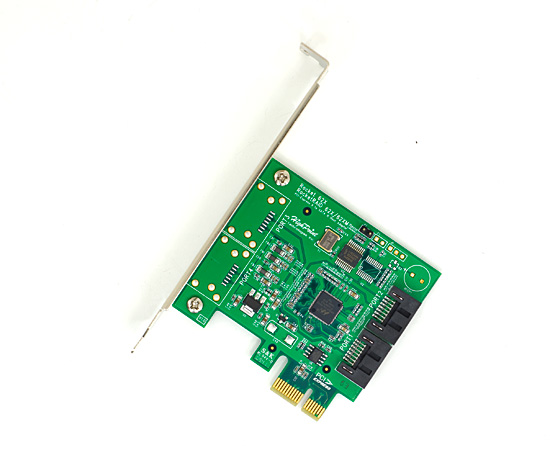OCZ’s Vertex Limited Edition Review & SSD State of the Union
by Anand Lal Shimpi on February 19, 2010 12:00 AM EST- Posted in
- Storage
Crucial/Micron RealSSD C300 - The Closest Competitor
While OCZ rushes to be the first to ship these superfast SSDs, Crucial and Micron will soon be shipping their RealSSD C300s. Based on a Marvell controller these drives (Crucial for the channel, Micron for OEMs) are far more traditional in their architecture.

Instead, the innovation comes from the use of ONFi 2.0 MLC NAND flash and a 6Gbps SATA interface. The combination of the two results in some extremely high sequential speeds. A seemingly well architected firmware (and a boatload of DRAM) work together to deliver good random access performance as well.


In testing the C300 it performed very much like a faster X25-M, there was one anomaly that bothered me: maximum write latency.
Like Intel’s X25-M, whenever the C300 goes to write data it also does a bit of cleaning/reorganization of its internal data. The more cleaning the drive has to do, the longer this write process will take. Micron did its best to minimize this overhead but eventually you’ll have to pay the piper. Below you’ll see the average IOPS, average MB/s, average and max write latencies for the C300, X25-M G2 and Vertex LE during my 4KB random write test:
| 4KB Random Write Performance | Average IOPS | Average MB/s | Average Latency | Max Latency |
| Crucial RealSSD C300 | 36159 IOPS | 141.3 MB/s | 0.0827 ms | 1277.9 ms |
| Intel X25-M G2 | 11773 IOPS | 46.0 MB/s | 0.255 ms | 282.9 ms |
| OCZ Vertex LE | 41523 IOPS | 162.2 MB/s | 0.072 ms | 109 ms |
While both Crucial and OCZ/SandForce offer incredible average write latencies, Crucial’s max latency is over a second! I haven’t actually seen max write latencies this bad since the JMicron days. But if you look at the average write latency, you’ll see that this max latency scenario basically never happens. I only worry about what happens when it does.
Crucial also warned me that despite the controller’s desire to keep performance as high as possible, if I keep bombarding it with random writes and never let up it may reach a point where it can no longer restore performance to an acceptable level. This sounds a lot like what Intel encountered with the original X25-M bug, although it’s not something I was able to bring about in normal usage thus far. Given the early nature of many of these drives, it’s going to take a lot of consistent use to figure out all of their quirks.
Overall performance of the C300 is excellent. Just like the Vertex LE, it performed admirably in all of our tests. Paired with a 6Gbps controller there’s actual a noticeable improvement in real world performance, although it’s limited to those scenarios where you’re doing a lot of sequential reads from the drive.

6Gbps SATA controller on a PCIe x1 card
The drive’s performance does come at a price. The RealSSD C300 will be available later this month in 128GB and 256GB configurations, priced at $499 and $799 respectively.










83 Comments
View All Comments
anikolayev - Friday, February 19, 2010 - link
I just bought an OCZ Agility based on your benchmarks, the ones suggesting the drive is capable of 160MB/s writes. However it has been confirmed by several other customers that the current batch being shipped by NewEgg uses different chips in the OCZ lottery which comes up with 100-130MB/s writes. This is very significant for people buying this drive for video capture related purposes, since 100 is hardly any better than the average 70 on a standard HDD.The Agility's random writes that you show in the charts and latest article are also almost double of the drives being shipped right now. After countless tweaks I can barely do 7MB/s, forget 12.
I understand the Agility is a dated drive, but it's still very popular due to recent sales ($130 for 60GB) and I think it would help your readers to take a look at updated performance numbers that are more realistic to what they will actually get.
Also there's no refunds with SSDs, so anyone buying into these charts will just have to live with what they get.
v12v12 - Tuesday, February 23, 2010 - link
FYI... 100 vs 70 is THIRTY PERCENT FASTER DUH? 30% is HUGE in regards to technological competition/advancements. Where have you been all these years? Show us a 30% performance gain (aside from SSD beta testing and new releases) in 1-2 mechanical HD generations... Umm you CAN'T>.<AnnonymousCoward - Tuesday, February 23, 2010 - link
> FYI... 100 vs 70 is THIRTY PERCENT FASTER DUH?Duhhh it's 43% :)
hardwareguy - Saturday, February 20, 2010 - link
If you want and SSD that's fast and cheap the agility is hard to beat. If that last bit of performance is important you can buy one of the vertex turbos or an intel drive but it quickly gets un-cheap. Even a 3/4 speed agility is still 10x better than a spinning metal drive.Anand Lal Shimpi - Saturday, February 20, 2010 - link
Hmm, what size drive do you have? I tested the 120GB Agility I believe which has higher read/write specs than the rest.Take care,
Anand
bji - Friday, February 19, 2010 - link
They've admitted that they are building only a limited number of drives, so how will they honor the three year warranty? It's unlikely they will be able to replace a dead drive with another OCZ Vertex Limited Edition, since there won't be any more. Will they replace with an equivalent drive? If so, what would the equivalent drive be?I continue to be skeptical of SandForce's controller technology. I would be interested in seeing some more rigorous testing done on these drives, such as repeated and random simulated power outages during writes, to ensure that the drive doesn't brick itself if power is lost at an inopportune time (especially as this version does not have the supercap).
Exelius - Wednesday, February 24, 2010 - link
Typically what they would do is either hold back a percentage of production for warranty replacements. Once they run through these they'd just offer you an equivalent current product.LazerFX - Friday, February 19, 2010 - link
Someone's not read the article...From the "Final Words" page, reproduced here so that anyone else reading the first few pages can get the answer:
"If you’re willing to take the risk, the Vertex LE appears to be the best SSD you can buy at $399. It is a difficult proposition simply because we have had such limited experience with the drive and the controller/firmware have a completely unproven track record. It really boils down to how much of an early adopter you are. At least OCZ as a company tends to take care of its customers, so even if you do take the jump and something does go wrong you won’t be SOL. The Vertex LE will ship with a 3 year warranty and if your drive dies you'll get another LE (OCZ is putting some aside), Vertex 2 or other equivalent in its place.
OCZ’s CEO Ryan Petersen and I could always get into another yelling match if you aren’t taken care of."
So... there you go.
Kibbles - Saturday, February 20, 2010 - link
even if they run out of those they put aside. they still have the enterprise versions.bji - Friday, February 19, 2010 - link
Absolutely right, my answer was there and I posted before reading all the way to the end. Mea culpa.